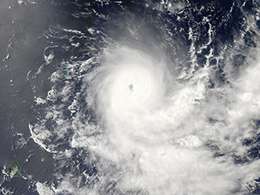Disaster victims: will pay for power not police

(Phys.org) -- Australians in natural disaster hot spots may be willing to pay more for fresh food and faster resupply of utilities – but not for a greater police presence or accommodation of pets in shelters, according to research from The Australian National University.
Associate Professor Leo Dobes and Professor Jeff Bennett from the Crawford School of Public Policy in the ANU College of Asia and the Pacific, surveyed residents of Cairns after Cyclone Yasi struck in 2009 about what services they were willing to cover after a cyclone.
“In February 2009, major retail food outlets in central Cairns had empty shelves in the fresh meat and vegetable sections. Trucks carrying fresh produce from Brisbane to Cairns had been cut off by the flooding of the Bruce Highway,” said Professor Dobes.
“Some dry goods were still being shipped in by sea and air, but a shortage of refrigerated containers meant there was a lack of fresh and frozen food.”
Professor Dobes said he and Professor Bennett wanted to study whether there were better alternatives for the resupply of fresh food to north Queensland communities isolated by cyclonic flooding and whether Cairns residents would be happy to pay for them.
“Cairns residents were on average prepared to pay about $62 per annum for faster resupply of fresh food. Interestingly, they were willing to pay on average $179 – about three times more than for fresh food – for faster reconnection of electricity, gas, water and sewerage,” Professor Dobes said.
“The willingness to pay more for faster resupply of utilities than fresh food could be explained by the fact that fresh food is all well and good but you need to be able to cook that food, and preferably in your own home. Resupply of utilities – electricity, water, sewerage – needs to be considered as a complement to the resupply of fresh food.
Professor Dobes said Cairns residents were not willing to pay for other services, such as extra policing.
“The average amount that people were willing to pay for longer police patrols was $0. Anecdotally, this was because even after a natural disaster such as a cyclone, residents felt fairly safe because they have a community spirit of helping each other. It’s the media who tend to beat up the idea of looting,” he said.
“Cairns residents were not willing to pay for accommodation of pets in a shelter after a cyclone. It seems people prefer that any money is directed towards people rather than animals.”
The survey forms for the study were distributed and collected by the Cairns Lions Club, headed by President Thelma Spelta, raising almost $50,000 which will go back into the Cairns community.
Provided by Australian National University

















